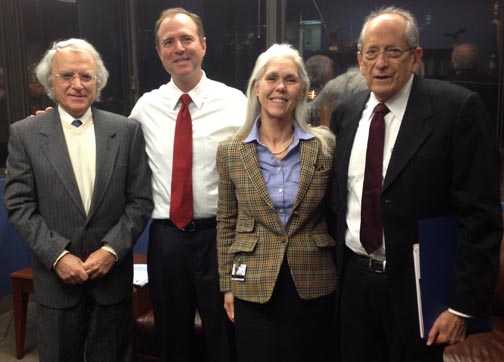
Yesterday UKRO President, Ken Kleinberg, Vito Campese, M.D., Chief of Nephrology of the Keck School of Medicine of USC, and kidney researcher Alicia McDonough, Ph.D., met with Representative Adam Schiff to ask for his help in preventing sequestration cuts that would severely limit NIH funding for research. Speaking on behalf of UKRO and the USC/UKRO Kidney Research Center, Dr. Campese stressed that research is essential to new medical advances that will drive down the skyrocketing cost of healthcare. He pointed out the high cost of the burgeoning epidemic of kidney diseases and hypertension. Kidney disease consumes nearly 7% of Medicare costs and 27.6% of Medicare expenditures. Approximately 26 million Americans have kidney disease and that number is expected to increase. Today there are more than 95,000 people in need of a kidney transplant and the average wait for a kidney is 8 years. There simply aren’t enough kidneys for everyone. Research provides the best hope for life-saving medical advances for these patients. Congressman Schiff brought up the fact that even if a patient is lucky enough to receive a transplant, Medicare funding for anti-rejection drugs runs out three years after transplant. Such a patient could end up back on dialysis—a tragedy not only in human, but economic terms; caring for a dialysis patient is far more expensive than caring for a transplant patient.
Ken Kleinberg shared the story of his FSGS diagnosis, subsequent kidney failure and years spent on dialysis. He acknowledged that he is alive and healthy today because of improved treatments, procedures and medications derived from decades of medical research, but even so, there is still so much more scientists need to learn about diseases like FSGS. Without NIH funding for research, important scientific work will cease.
Dr. McDonough spoke on behalf of the American Society of Nephrology, which represents 14,000 physicians, scientists and other healthcare professionals dedicated to curing kidney disease. Even currently, before the potential cuts, funding has dried up at the NIDDK for both small start-up grants and big program grants that usually help new junior investigators set up their labs. Only 10% of the individual research grant applications are funded overall, so it is very difficult for new investigators in the pipeline to compete. Some researchers have decided to go to Singapore to work.
Representative Schiff was responsive, commenting that he agrees with President Obama on the importance of funding research to improve the economy and that not doing so is, “eating our seed corn.” Everyone agreed that support for research and the importance of innovation, production, and progress has always been a part of the American ethos and it must be maintained. NIH funding must be protected. It generates jobs, stimulates the economy and ultimately helps save American lives.

To even consider cutting funding for Kidney reserach woulld be a crime against 26 million taxpayers. Especialy when I look at the numbes spent on entitlement programs that take care of healthy people who do not want to work or who just want to received government funds for having babies out of wedlock – or even a free cell phone entitlement that is being abused all over the United States. Yes, I am a stage three kidney failure person who has worked for 55 years and paid all my taxes and never partaken of any government program other than the research that is going on now for kidneys. I want a cure, yes for me, but more importantly for my two children who have also contracted this horrible disease from me.
Anthony Bellotte